1 July 2015 Edition
The Rossa funeral – prelude to the Easter Rising
Remembering the Past
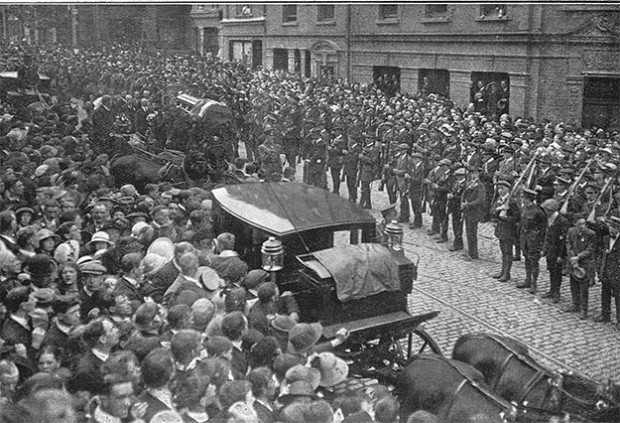
• The funeral leaving Dublin City Hall
A wide cross-section of people came to his lying in state in City Hall, including young Irishmen in British Army uniform, one of whom was seen saluting Rossa
VETERAN FENIAN Jeremiah O’Donovan Rossa died in New York on 29 June 1915. His widow wrote to Tom Clarke of the Irish Republican Brotherhood requesting him to make arrangements for Rossa to be given a public funeral in Ireland. It was to be held under the auspices of the Wolfe Tone Memorial Association which was the public face of the clandestine Irish Republican Brotherhood.
Clarke immediately commenced the work and a very large O’Donovan Rossa Funeral Committee was established, with 13 sub-committees to deal with all aspects of the arrangements. The Funeral Committee membership list reads like a who’s who of Irish republicans, advanced nationalists and progressive labour activists of the day. It included 11 of the leaders of the Rising who were executed ten months later.
The General Officer Commanding and Chief Marshal of the funeral was Commandant General Thomas MacDonagh of the Irish Volunteers. Commandants Edward Daly and Éamonn Ceannt commanded the overall Irish Volunteers and the Dublin Brigade contingents respectively. James Connolly commanded the Irish Citizen Army, Pádraig Ó Riain Na Fianna Éireann, and Cumann na mBan was led by Jenny Wyse Power. Other members included Arthur Griffith, Constance Markievicz, The O’Rahilly and William O’Brien.
Rossa’s body arrived in Dublin on Tuesday 27 July and was brought to the Pro-Cathedral in Marlborough Street, where large crowds came to pay their respects. Requiem Mass was said the next day. A guard of honour of the Irish Volunteers and Irish Citizen Army then accompanied the body to the rotunda of the City Hall, where the lying in state was held over the following three days. The coffin was draped in the Tricolour and a guard of honour kept vigil.
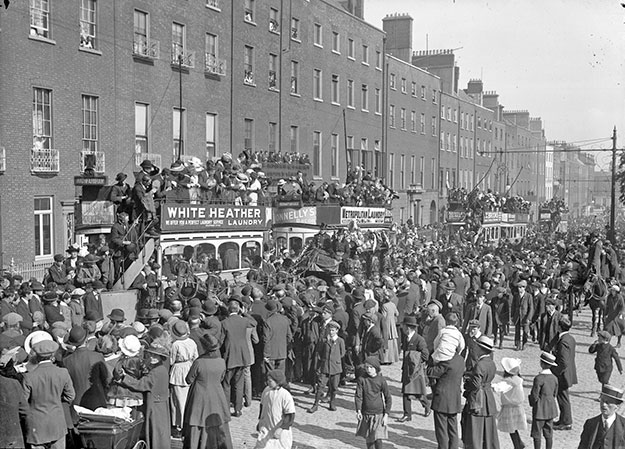
Sligo republican Fr Michael O’Flanagan spoke at the opening of the lying in state. He was a radical young priest famed for his oratory and for standing with the people in land and labour struggles in the West. He risked prosecution under the Defence of the Realm Act when he said: “If we have great powers in the world today who profess they are fighting for the liberty of small nationalities and . . . if these powers are not sincere in their professions . . . we shall do our part to tear the mask of hypocrisy from their faces.”
Thousands of people filed past the coffin in City Hall. In the funeral souvenir brochure, Seán Mac Gadhra describes the wide cross-section of people who came to City Hall, including young Irishmen in British Army uniform, one of whom was seen saluting Rossa.
Thousands of people travelled from all over the country and abroad for the funeral procession on Sunday 1 August. 17 special trains arrived but many were prevented from travelling because some railway companies refused to put on special trains and in these places local ceremonies were held.
The funeral procession from City Hall began at 2:45pm and was led by the St James’s Band and armed ranks of the Volunteers’ Dublin Brigade. Beside the hearse marched veterans of the Fenian Movement. A huge number of contingents took part, including Volunteers from all over Ireland, representatives of councils, trade unions, GAA clubs and more, and the overall attendance was tens of thousands.
The grave was in what became the Republican Plot, beside Fenians who had been comrades of Rossa. Fr O’Flanagan recited the prayers and a volley of shots was fired in salute by Volunteer and Citizen Army riflemen.
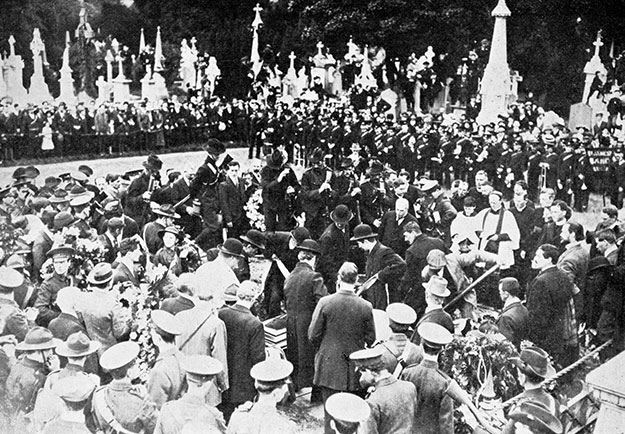
Pádraig Pearse had been requested by Tom Clarke to deliver the graveside oration. When Pearse asked how far he could go, Clarke replied: “Make it as hot as hell. Throw discretion to the winds.” The oration became one of the key texts of Irish republicanism and a call to arms that was answered on Easter Monday 1916 – “Ireland unfree shall never be at peace.”
The ceremonies and public funeral of O’Donovan Rossa took place 100 years ago, from 27 July to 1 August 1915.
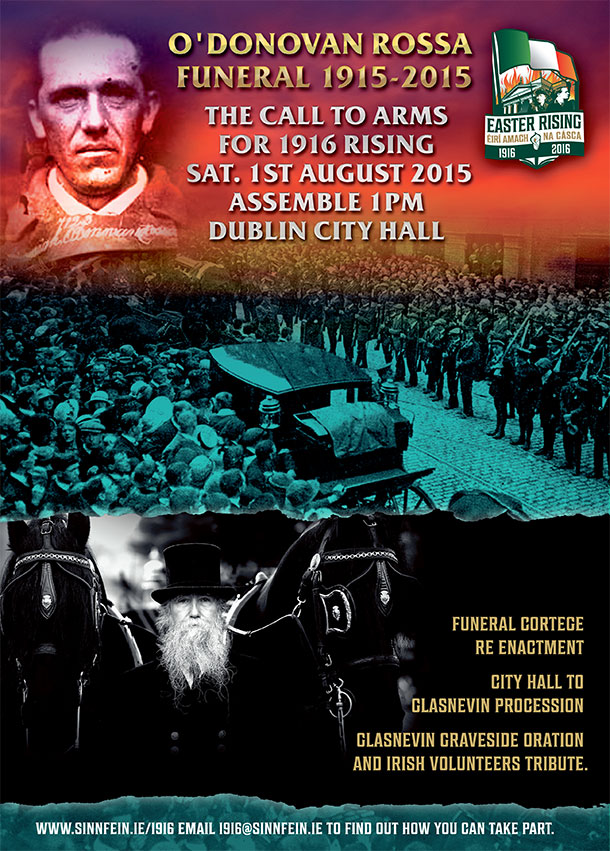
Public urged to get involved in centenary commemoration
O’Donovan Rossa Funeral Souvenir Programme Centenary Edition
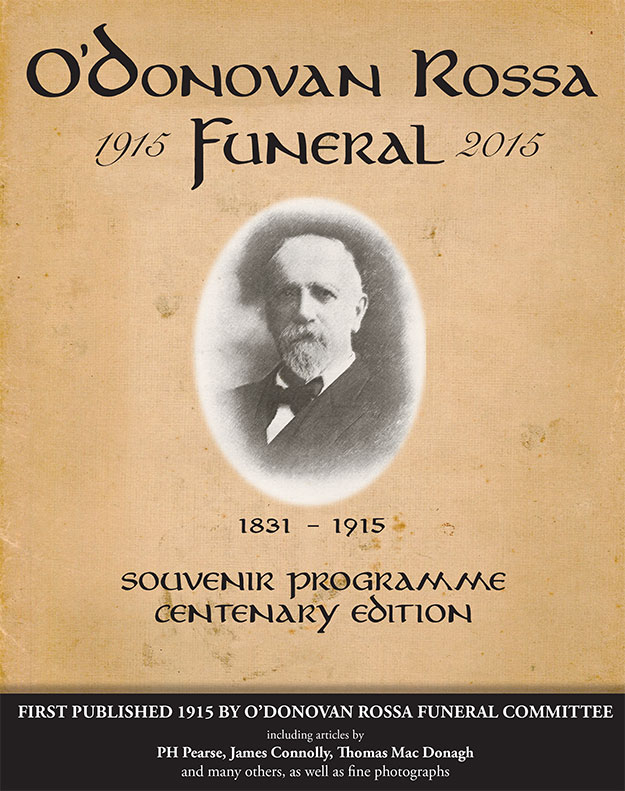
First published 1915 by O’Donovan Rossa Funeral Committee
This is a Centenary edition, fully reproducing the original brochure published after the funeral in 1915, including articles by Pearse, James Connolly, Thomas Mac Donagh and many others, as well as fine photographs.




